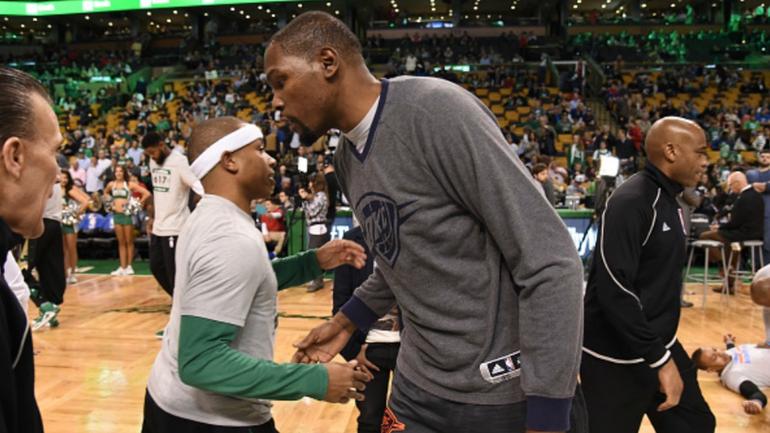Around this time last year, many people were up in arms with former league MVP Kevin Durant’s decision to join the Golden State Warriors via free agency for many reasons.
However, newly acquired Cleveland Cavaliers All-Star point guard Isaiah Thomas recently voiced in a Players’ Tribune piece that he’s hoping that his trade will help change the public perception of Durant’s move.
Plus, in a lot of ways, I actually think this was a good lesson. Not only for me, but for the league as a whole. And for the fans and the media, too, you know, just in terms of how they talk about guys changing teams. I was thinking about that last year with KD and his free agency — about how people gave him such a hard time for doing what he felt was best for him and his future. How they turned him into a villain, just for doing what was his right to do as a free agent in this league. Suddenly, it was, “Oh, he’s selfish,” or, “Oh, he’s a coward.” Suddenly, just for doing business on his end, and doing right by himself, he was portrayed as this bad guy.
But that’s what I think my trade can show people. I want them to see how my getting traded — just like that, without any warning — by the franchise that I scratched and clawed for, and bled for, and put my everything on the line for? That’s why people need to fix their perspective. It’s like, man — with a few exceptions, unless we’re free agents, 99 times out of 100, it’s the owners with the power. So when players are getting moved left and right, and having their lives changed without any say-so, and it’s no big deal … but then the handful of times it flips, and the player has control … then it’s some scandal? Just being honest, but — to me, that says a lot about where we are as a league, and even as a society. And it says a lot about how far we still have to go.
What Thomas is hoping is that fans take away from his trade is that it’s something that can go both ways. A player can show the utmost loyalty to a team but can be dealt away in an instance and be seen as solely being a business move. Meanwhile, a player’s decision to choose to go to a team where they believe is best for them is seen as the opposite with them being characterized as disloyal and a traitor.
There is clearly more to it and an unfair balance of opinions that come about from this that leans more heavily in the favor of the team operating in its best interest as the less criticized manner. In Thomas’ eyes, this is a strong example of this being the case of a player being traded from an organization that they have a strong commitment to stay long term.
Ultimately, the public perception is out of the players’ control but Thomas’ point should take much consideration for how things often play out in the NBA that are not looked upon in the same manner.
